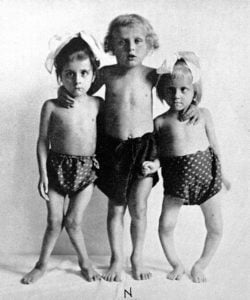
A feral child is a human who has lived away from human contact from a very young age and has little or no experience of human care, loving or social behavior, and, crucially, human language. Feral children are confined by humans (often parents), brought up by animals, or isolated in the wild. This is the story of Isabelle.
An illegitimate child
Isabelle was born in 1932. She was an illegitimate child and was kept in seclusion for this reason. Her mother had developed normally up to the age of two years and then, due to an accident, had become deaf-mute and had not been educated.
From the day Isabelle was born until she was a little over six years of age, mother and child spent their time together in a dark room with the blinds drawn, separated from the rest of the family. The mother’s parents did not permit her to leave the house alone.
Escaping from home
Isabelle’s mother eventually escaped, carrying her child with her, and in this way, Isabelle’s case was brought to the notice of the authorities.
As a result of the lack of sunlight, fresh air, and proper nutrition, Isabelle developed a rachitic condition that made locomotion virtually impossible. This condition yielded to proper treatment, including surgery, and Isabelle learned to walk and move normally.
When Isabelle’s intelligence was first tested at six and a half years old, her mental age appeared to be about nineteen months. In place of normal speech, she made a croaking sound.
Rapid improvement
Through intensive training and a stimulating environment, Isabelle improved so much that she was considered a child of average intelligence by the age of eight.
Her language development had been rapid: by that time, she already had a vocabulary of 1,500 to 2,000 words, she enjoyed and could recite nursery rhymes, and she could tell a story and make one up. She could now create and share a world of imagination with others and was not confined in her use of language to the immediate and the concrete.
Edublox offers cognitive training and live online tutoring to students with dyslexia, dysgraphia, dyscalculia, and other learning disabilities. Our students are in the United States, Canada, Australia, and elsewhere. Book a free consultation to discuss your child’s learning needs.
.

